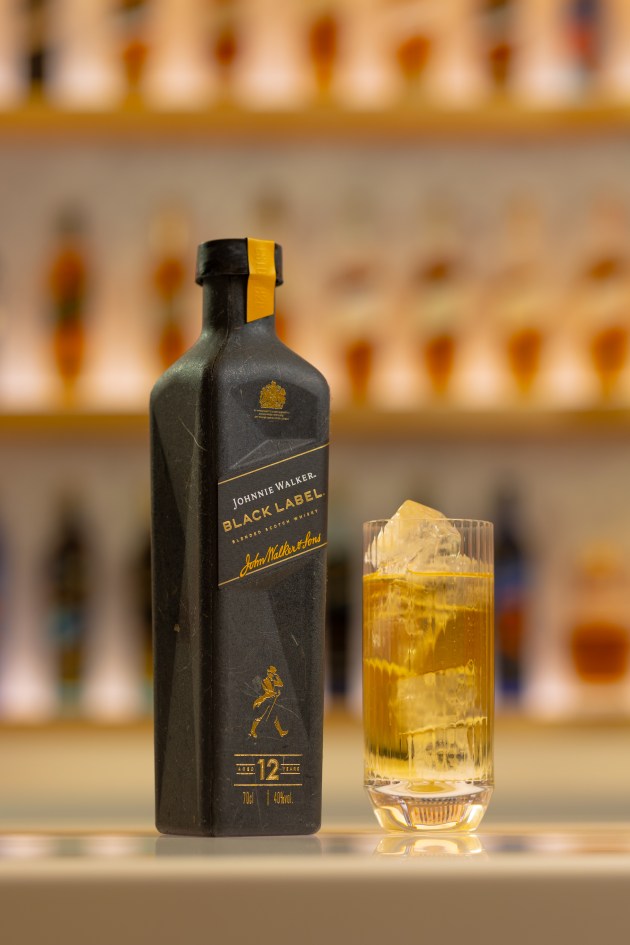Diageo has launched a first-of-its-kind 90 per cent paper-based bottle trial for Johnnie Walker Black Label exclusively at Johnnie Walker Princes Street’s 1820 bar, in Edinburgh.

Created in partnership with PA Consulting, as part of the Bottle Collective with PA and PulPac, this is Diageo’s first paper-based 70cl (700ml) bottle trial in the on-trade segment.
The trial will assess how bartenders interact with and pour from the bottle, and how the bottle fares in a bar environment.
A total of 250 paper-based bottles will be used with the trial expected to run until mid-October. Members of the public will be able to see the bottles in use behind the bar, however they cannot purchase the bottle.
This will be the second paper-based bottle trial from Diageo and PA, following the success of the Baileys paper-based bottle mini format (80ml) trial, using a similar Dry Moulded Fibre innovation at the Time Out Festival in Barcelona earlier this year.
The design team have taken learnings from the technical aspects of the miniature format to make a larger and more complex shape for Johnnie Walker.
The bottle’s design retains the iconic square shape of Johnnie Walker Black Label, while enhancing the premium appeal with unique facets cut into the sides of the bottle and embossing of the Striding Man on the bottle and closure.
“We are constantly pushing the boundaries of innovation to not only deliver the premium quality and iconic design our customers expect from us, but to do so in a way that reflects our sustainability ambitions,” said Jennifer English, Johnnie Walker’s global brand director.
“The paper-based bottle trial for Johnnie Walker Black Label marks a significant step forward in our journey.
“This test allows us to explore new packaging in the high intensity environment of the on-trade. We are pioneering new packaging solutions and shaping the future of the industry.”
The trial bottle is made from 90 per cent paper and a very thin plastic liner. The company says the innovative technology makes the paper-based bottle approximately 60 per cent lighter, with initial external life cycle analysis on the prototype showing an up to 47 per cent potential reduction in carbon emissions, compared to the Johnnie Walker Black Label glass bottle equivalent.
The bottle closure was developed in collaboration with PulPac, Setop DIAM and PA and is made from a unique combination of cork and similar Dry Molded Fiber paper technology as the bottle. It is only intended for use during the trial and excluded from calculations.
The Johnnie Walker Black Label paper-based bottle for this test is designed considering recyclability among other aspects.
The plastic liner is designed to not require consumer or bartender disassembly, as it is not attached or bonded to the outer paper layer, assisting recycling facilities to separate without disrupting the recycling process.
The stopper used for trial purposes is not recyclable, however alternative solutions are in development.
Throughout the trial and further development of the paper-based bottle, the recycling capability will be a key factor for future versions of the bottle as the company continues to test, learn and develop.
“PA is delighted to have worked with Diageo and PulPac to produce these paper-based bottles for Johnnie Walker Black Label,” said Jamie Stone, design and innovation expert at PA Consulting.
“These bottles break new ground in packaging design and shows the potential to significantly reduce carbon emissions, while seeking to maintain the elegance, luxury and bottle size expected in the premium drinks market.
“PulPac’s Dry Molded Fiber technology opens up new possibilities for cost-effective, lightweight, less carbon intensive and more sustainable packaging.
“We look forward to collecting feedback from bartenders and the public following the market trial, so we can test and refine the bottle and technology further.”
Diageo and Johnnie Walker continue to explore paper formats across the wider portfolio as a means to reduce carbon emissions. This includes an ongoing partnership with Pulpex as they continue to develop and internally test their initial concept paper-based bottle, which is currently in feasibility testing.
Beyond paper-based solutions, the brand recently introduced Johnnie Walker Blue Label Ultra, what the company is calling the world’s lightest whisky glass bottle, weighing just 180g without the stopper, and the result of years of experimentation and innovation.
The bottle features a unique teardrop shape, lattice stopper, and bamboo frame to bring luxury and simplicity together.
While Johnnie Walker Blue Label Ultra is a design experiment, the insights gained will guide future glass lightweighting initiatives across the Diageo portfolio.
These latest innovations form part of Diageo’s ambition to reduce its carbon footprint by exploring new packaging formats, including the launch of a 70cl (700ml) aluminium spirits bottle with Baileys, a global licensing agreement with circular economy technology company ecoSPIRITS, and removing the cardboard gift boxes in its premium Scotch portfolio to reduce excess packaging.
Recently, PulPac and PA also developed the Dry Molded Fiber bottle cap, which is now also being tested with the Bottle Collective.





